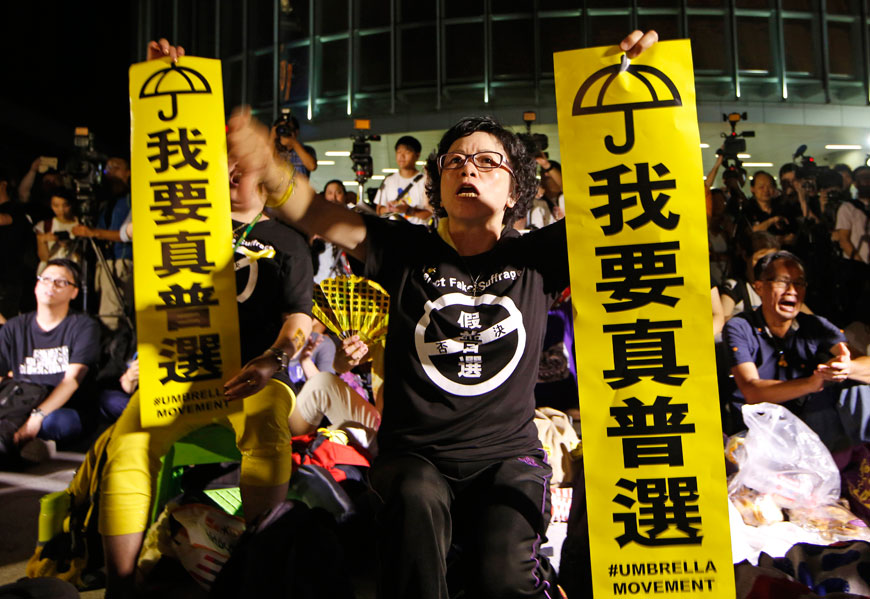HONG KONG — Hong Kong's pro-democracy lawmakers appeared to be standing firm on Wednesday in their pledge to veto Beijing-backed electoral reforms, as the Asian financial centre's legislature debated the package that will define its democratic future.
The former British colony has reinforced security after mass protests crippled parts of the city late last year, presenting China's ruling Communist Party with one of its biggest political challenges in decades.
More than a thousand people converged outside government buildings as debate began on a blueprint that would allow a direct vote for Hong Kong's next leader in 2017, but only from pre-screened, pro-Beijing candidates.
Opponents want a genuinely democratic election for the city's chief executive in line with Beijing's promise of universal suffrage made when the territory returned to Chinese rule in 1997.
Pro-democracy activists climbed over metal fences separating them from the Beijing supporters, many of whom were wearing numbered shirts, the significance of which was not immediately clear. The two sides cursed and threw garbage and fights broke out.
The council adjourned in the evening without a vote which is expected no later than Friday. Democracy activists swore at pro-establishment lawmakers as they filed out of the building.
"You don't represent us, you represent the central government!" one middle-aged woman shouted, using a common and colourful Cantonese expletive.
Hong Kong's 27 "pan-democrats", who hold a crucial one-third veto bloc in the 70-seat Legislative Council, have vowed to oppose what they call a "fake" democratic model. Three democrats who spoke early during the debate reiterated that pledge.
If the reform proposals are passed unexpectedly, pro-democracy groups have vowed to protest.
"This morning I got a very long and well-written letter, which was from a student. [They] hope I will support the proposal," democrat Ronny Tong, who was close to tears, told reporters before the debate began.
"I cannot think of anyone in Hong Kong who is happy today. I have been a legislator for 11 years, with an aim to fight for universal suffrage. Today I will cast a negative vote for an incomplete and unsatisfactory political reform proposal."
Democratic lawmaker Claudia Mo called the package a "maggot-eaten apple".
"This motion, this resolution is a fraud," Mo said. "This bill makes nonsense of the word democracy. It is a very bogus version of universal suffrage."
Last year's protests revealed sharp divisions in Hong Kong and public opinion on the reforms remains split.
The final round of a rolling poll conducted by three Hong Kong universities showed 47 per cent of respondents backed the reform proposal. Thirty-eight per cent were against, while 15 per cent were undecided.
‘Cannot go on like this’
Beijing supporters easily outnumbered the roughly 400 pro-democracy protesters on Wednesday. Activist groups had said they expected 100,000 protesters to show up.
"The bill needs to go through. We have to support Hong Kong stability. We cannot keep carrying on like this," said a 60-year-old man surnamed Chan, who declined to give his first name.
"We have worked so hard all these years," said Chan, who was waving a Chinese flag. Pro-Beijing supporters also played the Chinese national anthem through loudspeakers.
One pro-democracy protester wearing a black T-shirt which read "Reject Fake Suffrage" held a black-and-white banner that declared: "Overthrow the Communist dictatorship."
Inside the legislature, democrats stood in a row with signs with crosses on them as they pledged to vote down the plan.
Tension has been running high, especially after 10 people were arrested this week on suspicion of explosives offences. Six of them appeared in court on Wednesday charged with conspiracy to cause an explosion. The six were not asked to enter pleas.
A 29-year-old woman was let out on bail of HK$20,000 ($2,580). Five men were remanded in custody.
The Communist Party's official People's Daily said in a front-page commentary that the vote was fundamentally about ensuring long-term prosperity and stability.
The proposed package, it added, was designed to be a broadly representative one all sides could accept.
"Looking around the world, some countries' and regions' universal suffrage systems are not in line with the actual situation on the ground, causing social chaos, economic hardship and difficulties too numerous to mention," the paper said.
Beijing has tried to lobby pro-democracy lawmakers to back the blueprint.
Hong Kong's Independent Commission Against Corruption has also said it is investigating allegations by an unidentified legislator that he was offered a bribe to vote for the package.
Hong Kong returned to China under a "one country, two systems" formula that gives it a separate legal system and greater freedoms than the party-ruled mainland — and the promise of universal suffrage.
Thousands of activists blockaded major roads across Hong Kong for 79 days last year, defying tear gas and pepper spray, to press China to honour that promise.
While flawed, the package is still the most progressive electoral model ever offered by China's leaders in what might be a pilot for other cities within mainland China, according to a source close to Beijing's leadership.
If the plan is vetoed, Hong Kong's next leader will be selected as before by a 1,200-member committee stacked with pro-Beijing loyalists. Beijing would be unlikely to offer any fresh concessions to Hong Kong anytime soon.
